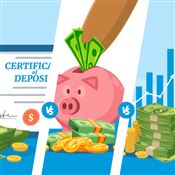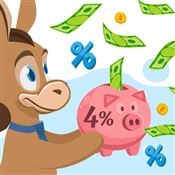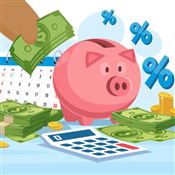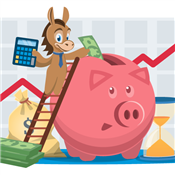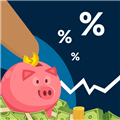Which Savings Account Will Earn You the Most Money?
Ad Disclosure: This article contains references to products from our partners. We may receive compensation if you apply or shop through links in our content. This compensation may impact how and where products appear on this site. You help support CreditDonkey by using our links.
Looking for a savings account with the best return? Check this article to see which ones pay the most.
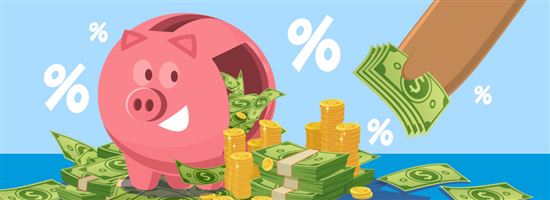 |
Make your money work harder for you. Savings accounts are low-risk investments that will help grow your money while you sleep.
But, with all the different options, which savings account will let you earn the most money? Read on to find out.
Which Savings Account Will Earn You the Most Money?
There are three kinds of savings accounts that allow users to earn money through competitive rates: high yield savings, money market, and certificate of deposit.
Let's take a closer look at each one to find out their differences and which account pays the most.
| High-Yield Savings | Money Market | Certificate of Deposit | |
|---|---|---|---|
| Interest rate | Variable | Variable | Fixed |
| Opening deposit | Sometimes required | Sometimes required | Required |
| Balance requirement | Sometimes required | Sometimes required | Required |
| Monthly fee | Sometimes | Sometimes | None |
| Accessibility | 6 transactions/mo | 6 transactions/mo | Penalty for early withdrawals |
| FDIC/NCUA insurance | Yes | Yes | Yes |
| ATM access | Sometimes | Sometimes | No |
| Check writing | No | Sometimes | No |
1. High-Yield Savings Accounts
A high-yield savings account is similar to a regular savings account except it pays higher rates that are (at least) 5x more than the national average.
It is mostly offered by online banks rather than brick-and-mortar institutions. This means your money may not be as accessible because there are limited physical locations and ATM access.
On the bright side, most high-yield savings accounts have no (or minimal) fees, so you truly get better returns in the end.
Pros + Cons:
|
|
- Axos ONE:
Earn up to 4.31% APY
Use the calculator below to see how much your money can grow.
2. Money Market Accounts
A money market account combines the features of a savings account and a checking account into one product. They're often more versatile and accessible than regular savings accounts.
Some accounts come with a debit card or ATM card, so it's easier to access your money if you need it. Many money markets also let you pay bills or write checks from the account.
However, money market accounts may require you to make an initial deposit or to maintain a certain balance.
Pros + Cons:
|
|
3. Certificate of Deposits
A certificate of deposit (CD) is a type of savings account where you must deposit a fixed amount of money for a fixed amount of time. In return, you get a fixed rate, even if market conditions change.
Many CD rates are higher than that of high-yield savings and money market accounts. Many longer term CDs pay higher rates because of the longer commitment.
However, remember that your money must remain locked up with the bank for the whole term. If you withdraw early, you will have to pay penalty fees.
Pros + Cons:
|
|
Which Account Should You Open?
If you are looking to earn more money for a short-term goal, opening a high-yield savings account is your best bet.
You can still access your funds when you need them, but you usually don't get ATM access, allowing you to really focus on growing your savings.
If you want something more flexible, opening a money market account is a good option. You get good rates while having more accessibility to your funds.
Lastly, if you have a long-term goal and are willing to keep your money locked up, you should definitely consider getting a CD. Rates are high and returns are guaranteed as long as you let your CD mature.
Can You Lose Money in a Savings Account?
Your money is safe in a savings account as long as the bank is FDIC-insured (or NCUA-insured for credit unions). For each institution, the federal government insures your funds up to $250,000 for individual accounts and up to $500,000 for joint accounts.
Anything over that amount is not guaranteed. So if you have a lot to save, it would be best to spread your money around to different FDIC-insured banks.
Do Savings Accounts Have Fees?
Your savings account could have fees. Below are common charges you can potentially encounter:
- Monthly fee: Fee charged if you don't meet a minimum balance. Luckily, there are lots of free online savings accounts.
- Excessive transaction fee: Most savings accounts limit you to 6 withdrawals/mo, and charge a fee for each one over that.
- Out-of-network ATM fee: Some savings accounts come with ATM cards. But if you use an out-of-network ATM, your bank or the ATM company can charge you for it.
- Early withdrawal fee (for CDs): When you withdraw money from a fixed-term CD before its maturity date, your bank will ask you to pay a penalty.
- Overdraft fee: If you spend more than what you have in your savings account, your bank can charge a fee to cover the overdraft.
There is no set amount for any of the fees above, meaning it differs per bank and per account.
How to Choose a Savings Account?
Here are some things to consider when choosing a high-yield savings account:
APY
A solid APY is probably the most important factor so you can earn as much as possible. But note that some banks require you to maintain a certain balance to earn the highest APY they offer.
Monthly fee
Many high-yield savings accounts have no monthly fees or initial deposit requirements. But, some may require a minimum balance to waive the fee.
Accessibility
How often do you think you'll need your money? If you're afraid you may need it in emergencies, look for a savings account that comes with an ATM card. If you don't need it for a while, you can consider a CD.
Digital banking experience
Most high-yield savings accounts are from online banks, so it's ideal to find one with good online/mobile banking features.
You can check the ratings of banking apps and what features/tools they offer to help you in making a decision.
Customer service
Should you have any questions or concerns regarding your account, you need a bank that offers good customer service. Luckily, there are banks with live agents available 24/7 via call or online chat.
Bottom Line
If you have a large deposit at hand and don't need your funds for a while, a CD ensures steady, guaranteed returns.
But, if you want something more flexible and accessible, you should consider opening a high-yield savings account or a money market account.
Ultimately, all three savings accounts will allow you to earn money through competitive rates.
Axos ONE - Earn up to 4.31% APY
- Earn up to 4.31% APY* on savings, and 0.51% APY* on checking when you meet requirements.
- Get your money up to 2 days early.
- No monthly maintenance, minimum balance, account opening, or overdraft fees.
Write to Darlene Santos at feedback@creditdonkey.com. Follow us on Twitter and Facebook for our latest posts.
Note: This website is made possible through financial relationships with some of the products and services mentioned on this site. We may receive compensation if you shop through links in our content. You do not have to use our links, but you help support CreditDonkey if you do.
|
|
| ||||||
|
|
|

